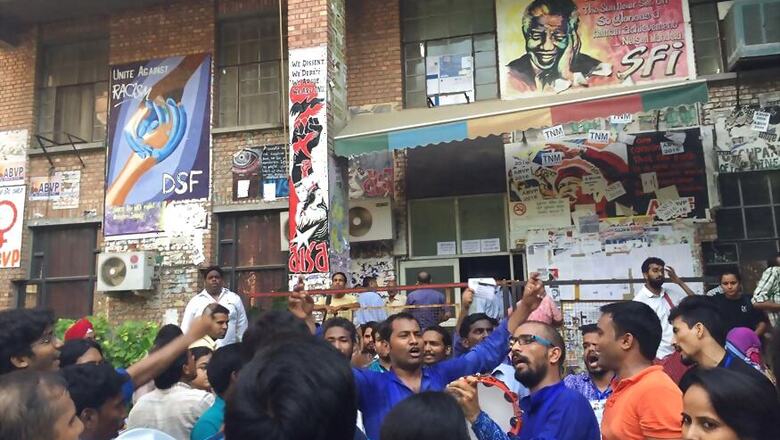
views
Communist doyen Professor Hiren Mukherjee had a dying wish. In a posthumously published letter he'd urged unification of all the Left forces in India.
More than a decade after his death, Mukherjee's advice to comrades, it seems, has finally been heeded to, albeit in student politics. The JNU Students Union elections saw Left-affiliated unions coming together to pulverise the right wing ABVP. Post the Kanhaiya Kumar episode, this was the first electoral test for the competing ideologies on the campus. "Many more such battles will have to be won before we win the war against the RSS-BJP and its poisonous ideology"; proclaimed CPM General Secretary Sitaram Yechuri in a Facebook post after results were declared.
Amid this war cry and jubilation, a closer peek into the electoral outcome in Indian's premier social sciences institution alludes towards a changing paradigm in subaltern politics. Hidden somewhere in the fine-print of the outcome is a powerful message to both the Left and Right of the Indian polity.
The emergence of Birsa Ambedkar Phule Student's Association or BAPSA in JNU as an umbrella student outfit representing tribals, dalits and other weaker sections of the society is a significant development which seems to have got lost in the high-decibel campaign and victory marches.
It is not a mean achievement that within two years of its inception, BAPSA candidate Rahul Sonpimple came a close second to a joint AISA and SFI nominee, losing by less than 350 votes for the president’s post while ABVP stood a distant third. For the other three key positions, BAPSA mopped up a respectable tally to emerge as an alternative force.
“For over twenty-five years, United Dalit Students Front or UDSF operated merely as a forum on the JNU campus. It never contested elections. These students were generally drawn towards SFI or AISA in the electoral arena”; says Jadumani Mahananda, a third year Phd scholar and a founding member of BAPSA.
On 15th, November, 2014, the birth anniversary of the tribal hero Birsa Munda, BAPSA was formed to challenge the existing order.
“It is a manifestation of identity politics,” says Professor Badri Narayan, the author of Kanshi Ram: Leader of the Dalits. “The dilemma of the Indian Left and its ideological limitation in dealing with caste gets manifested here”; he adds.
Kanhaiya Kumar’s powerful invocation of Ambedkar during the stand-off with the establishment was seen by many as an attempt by the Indian Left to bridge the caste vs. class divide. The results have however surprised many: BAPSA presidential candidate secured 500% more votes than the last time.
“ABVP was just a bogey,” says Chinmaya Mahananda, last year’s BAPSA presidential nominee who got 300-odd votes. “The real fight this year was with the BAPSA. The fear of losing its island bastion forced AISA and SFI to join hands,” he says.
BAPSA also claims that it got good support from minorities and students from North-East this time around which helped it pip some well established unions on the campus.
“It is a victory of Ambedkar’s ideology. Which is contiguous with the ethos of JNU, that is democracy,” says senior bureaucrat and JNU alumnus Rajshekhar Vundru.
On the face of it, the Left parties and its students union were most visible and loud in protesting government inaction in the aftermath of the suicide of Dalit scholar Rohith Vemula. However the mobilisation - if such an alternative is available - is silently building around those who are not only seen to be, but in real sense representing that sentiment.
Dalit writer Chandrabhan Prasad calls it the rising middle class within the community seeking equal station in the society. “The BJP may be doing a lot for Dalit entrepreneurs, but is adamant in taking in Vemula case. Congress over the years could not come out of the mentality that Dalits can be won over by providing ration cards. Similarly, the Left thinks it can endear Dalits by speaking on Rohith Vemula issue. They have to understand that for Dalits, Ratan Tata is better choice than Raja Bhaiyya,” he says.
The Dalit millennials - both in urban and rural India - perhaps are seeking their own space. They are young, they are restless and they are watching everything: from the protests in Hyderabad Central University to cow vigilantism and public flogging of Dalits in Una.
If JNSU polls are any indication, they are also making their own free choice in politics.


















Comments
0 comment